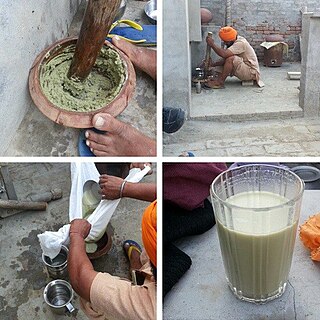
Bhang is an edible preparation of cannabis originating from the Indian subcontinent. It has been used in food and drink as early as 1000 BCE in ancient India. Bhang is traditionally distributed during the spring festival of Holi. Bhang is mainly used in Bhang shops, which sell the cannabis-infused Indian drinks bhang lassi and bhang thandai.
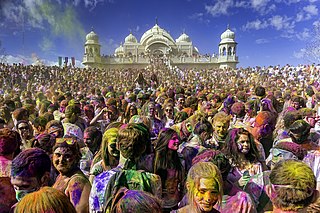
Holi is a popular ancient Hindu festival, originating from the Indian subcontinent. It is celebrated predominantly in India and Nepal, but has also spread to other areas of Asia and parts of the Western world through the diaspora from the Indian subcontinent. Holi is popularly known as the Indian "festival of spring", the "festival of colours", or the "festival of love". The festival signifies the arrival of spring, the end of winter, the blossoming of love, and for many a festive day to meet others, play and laugh, forget and forgive, and repair broken relationships. The festival also celebrates the beginning of a good spring harvest season. It lasts for a night and a day, starting on the evening of the Purnima falling in the Vikram Samvat Calendar, a Hindu calendar month of Falgun, which falls around middle of March in the Gregorian calendar. The first evening is known as Holika Dahan or Chhoti Holi and the following day as Holi, Rangwali Holi, Dhuleti, Dhulandi, or Phagwah.
Phalguna or Phālguna is a month of the Hindu calendar.
In India's national civil calendar, Phalguna is twelfth month of the year, and corresponds with February/March in the Gregorian calendar.
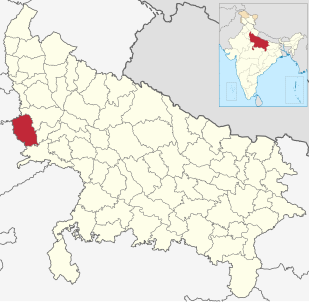
Mathura district situated along the banks of the river Yamuna is a district of Uttar Pradesh state of northern India. The historic town of Mathura is the district headquarters. The District is part of Agra division. Mathura is bounded on the northeast by Aligarh District, on the southeast by Hathras District, on the south by Agra District, and on the west by Rajasthan and northwest by Haryana state. Mathura district is an important pilgrimage centre of Hindus. Many towns in the district Mathura have banned alcohol and non-vegetarian food.

Tanahun District, a part of Gandaki Pradesh, is one of the seventy-seven districts of Nepal. The district, with Damauli as its district headquarters, covers an area of 1,546 km² and has a population (2011) of 323,288. Previously the town of Bandipur was its district headquarter. This district lies in the middlemost of country Nepal. The postal code of Tanahun is 33900. Maharisi Veda Vyash, author of the great Hindu epic Mahabharata, was born in Damauli Tanahun at the meeting point of river Seti and Madi. The headquarter of Tanahun is Damauli, which is part of Byas Municipality after his name. Vyash gufa is located near confluence of two rivers seti and madi in Damauli.

Hola Mohalla, also called Hola, is a one-day Sikh festival which most often falls in March and takes place on the second day of the lunar month of Chett, a day after the Hindu spring festival Holi but sometimes coincides with Holi. Hola Mohalla is a big festive event for Sikhs around the world.
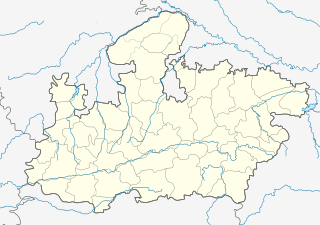
Ambah is a city and a municipality in Morena district in the state of Madhya Pradesh, India. It was formerly known as Ambrish Nagari. Satyapraksh shakhwar (SC) of the Bahujan Samaj Party (BSP) is the present MLA from Ambah-Porsa Constituency.

Barwaha is a municipality in Khargone district in the state of Madhya Pradesh, India. The Barwaha town is divided into 18 wards for which elections are held every 5 years. The Barwaha Municipality has population of 39,973 of which 20,940 are males while 19,033 are females as per report released by Census India 2011. Literacy rate of Barwaha is 87.27% higher than state average of 69.32%. In Barwaha, Male literacy is around 92.73% while female literacy rate is 81.23%.
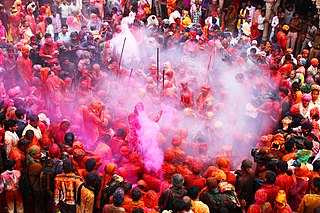
Lathmar Holi is a local celebration of the Hindu festival of Holi. It takes place days before the actual Holi in the neighbouring towns of Barsana and Nandgaon near Mathura in the state of Uttar Pradesh, where thousands of Hindus and tourists congregate, each year. The name means "that Holi in which [people] hit with sticks".

The Shri Swaminarayan Mandir, Karachi is a Hindu temple that belongs to the NarNarayan Dev Gadi of the Swaminarayan Sampraday and is the only Swaminarayan temple in Pakistan. The temple is notable for its size and frontage, over 32,306 square yards (27,012 m2) on the M. A. Jinnah Road in Karachi city. The temple celebrated its anniversary of 150 years in April 2004. It is believed that not only Hindus but also adherents of Islam visit the temple, which adds to its notability. There is a sacred cowshed within the premises of this temple. The temple is located at the centre of a Hindu neighborhood in Karachi. The building that housed a dharmshala for visiting devotees has now been converted to the office of the City District Government.
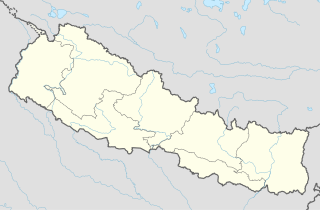
Ghailadubba is a small town and ancient market place in Kankai Municipality in Jhapa District in the Mechi Zone of south-eastern Nepal. At the time of the 1991 Nepal census it had a population of 11,185.

Surunga is a trade center of Jhapa District. It is located in Kankai Municipality in Jhapa District in the Mechi Zone of south-eastern Nepal. At the time of the 1991 Nepal census it had a population of 16,747 people living in 2996 individual households. Surunga is one of the rapidly developing towns of Jhapa district. It is situated on the bank of the Kankai River.
The Ratua Khola is a river in eastern part of Nepal. It originates from Chure Pahad of Nepal and merges with the Kankai River in Bihar, India. This river serves as the eastern border of Damak, a big and developed city in the eastern part of Nepal.
Laxmipur is a small town in the Jhapa District
It is situated in kankai municipality in between Biring river in the west and Ghagra river in the east. It is the biggest municipality in Jhapa district..
Laxmipur is developing rapidly in different sectors..education is improving.
holiday|holiday_name=Rang Panchami|type=hindu|longtype=religious, cultural, spring festival|date=per Hindu Calendar|frequency=annual|date2019=Monday, 25 March|date2020=Friday,13 March|image=|caption=Rang Pachami Celebration|relatedto=Holi|date2021=Friday, 2 April}}

Kotihome Dham is a religious site in Eastern Development Region, Nepal. It is located in the Kankai Municipality of Jhapa District. Other names it famously goes by are Kankai Mai and Kankai Dham.

Gulal (गुलाल), also known as Abeer (अबीर), is the traditional name given to the coloured powders used for the typical Hindu rituals, in particular for the Holi festival. During this festival, which celebrates love and equality, people throw these powder solutions at each other while singing and dancing.












